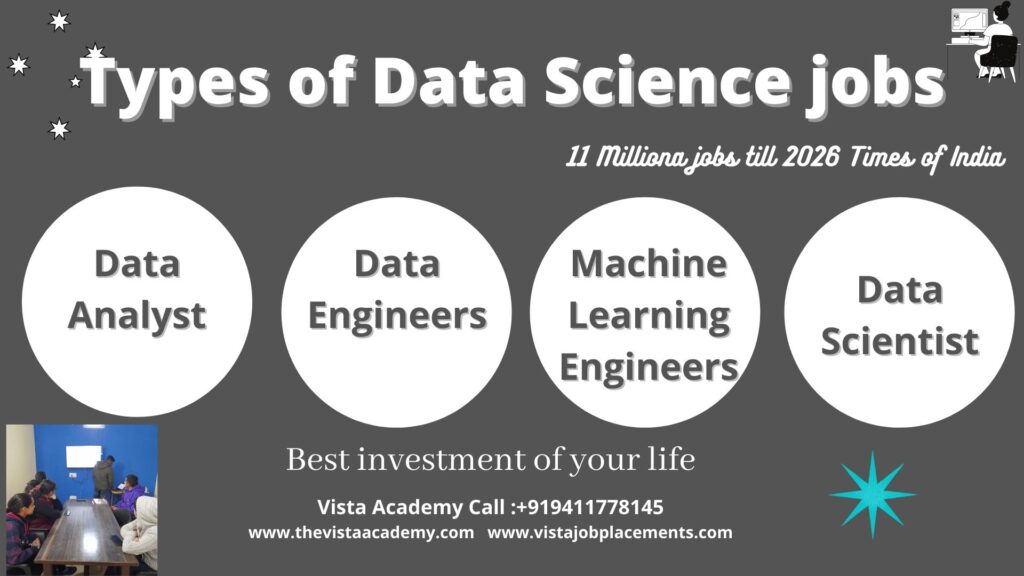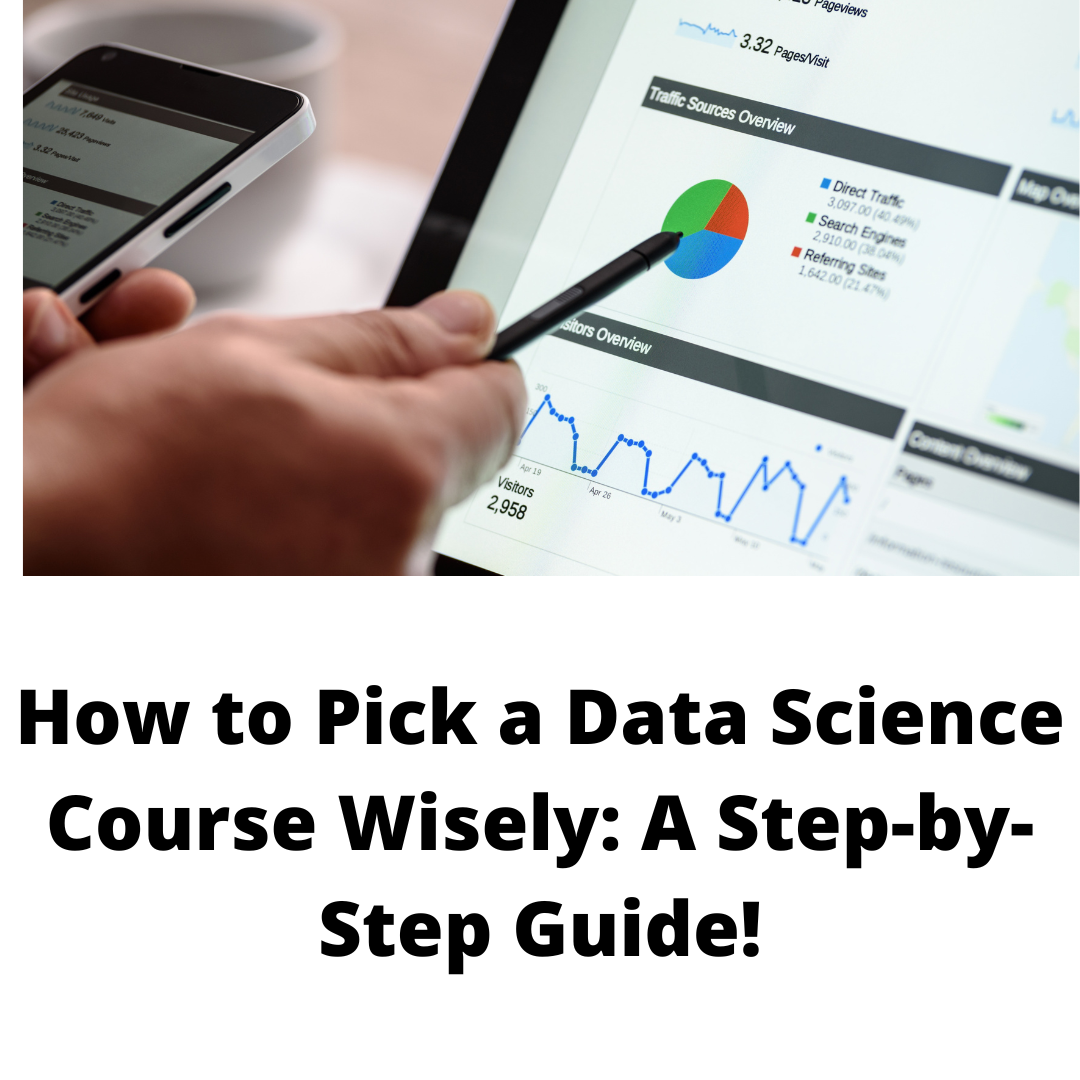How to Pick a Data Science Course Wisely: A Step-by-Step Guide!
So, you’re thinking about taking a Data Science course? Excellent choice! But wait…there are a few things you should keep in mind before purchasing a data science course. That’s why, in this article, I’ll show you How to Choose the Best Data Science Course for You. So, before enrolling in any data science course, do these measures.
So, without further ado, let’s get started and learn some new things. What to Look for When Choosing a Data Science Course
Table of Contents
ToggleHow to Choose a Data Science Course?
Practical sessions, Highly Experienced Instructors, Industry-Ready Updated Syllabus, Hands-On Projects, and Flextime are all features of a solid data science school.
What’s more important is to ask yourself, “What do you want to learn?” As a result, the area of Data Science is quite broad. There are a variety of positions accessible, such as Data Scientist, Data Analyst, Data Engineer, and so on.
To Ensure That You Specialize in Which Data Science Field

So, first and foremost, determine which role you are interested in and where you want to begin your career. Each function has distinct tasks, such as a Data Engineer who collects, moves, stores, and pre-processes data for Data Scientists and Data Analysts.
A Data Analyst is a person who examines data and visually portrays the important results from that data.\As a result, if you are unsure about which topic of data science you want to focus in, the course will become disorganised for you. And you’re not sure what you’re learning or why you’re learning it.
Data scientists, on the other hand, are analytic professionals who utilise their knowledge of technology and social science to uncover trends and manage data.
As a result, if you are unsure about which topic of data science you want to focus in, the course will become disorganised for you. And you’re not sure what you’re learning or why you’re learning it.
As a result, before enrolling in any data science course, make a clear goal. If you wish to specialise in Data Analytics, look into the tasks and responsibilities of a data analyst, as well as the skills necessary of a data analyst, and then look for data analyst courses that cover all of the essential areas.
Different Type of Data Scientists
Today, data science is an essential part of everyday company operations. Large amounts of structured and unstructured data are transformed into an invaluable resource for the organization by using techniques like data mining, cluster analysis, machine learning, visualization, etc.
Researchers
A data scientist is skilled in working with numbers. People who have a background in statistics typically work in this industry. Academics and statisticians share several fundamental competencies, such as the ability to visualise data and conduct quantitative research. By focusing on the important factors that affect performance, statistical models and theories can aid corporate decisions.
Developers
Algorithms created by data developers can direct the development of products and price plans. Additionally, they support the extraction of patterns from big data inputs for demand forecasting, which is crucial for inventory and supply chain management. These individuals can help and collaborate with statisticians to tackle challenging problems since they possess good programming and machine-learning skills.
Creatives
Data creatives work with enormous amounts of data to develop cutting-edge technologies. By creating new methods of thinking and learning, this group contributes to the development of a flexible learning organization. These individuals modify processes and systems by applying their scientific knowledge and unique ideas while using data as a compass. Data science creatives encourage an organization’s progress and growth by continually improving and reshaping how things are done. View List of Top Data Science Tools
Practitioners of Business
This group uses its technological expertise and expertise in business to make crucial business decisions. They are not only knowledgeable in data science but also have the tools necessary to draw insightful conclusions and apply those conclusions to actual circumstances. As a result, they establish a general culture founded on the ideas of reason and proof.
Product engineers and scientists
Additionally, product management and engineering are sectors where data scientists are employed. Their job is to design, create, and manage the knowledge that is available to comprehend how goods are manufactured. To further optimize the products, they employ analytics. The products and services that an organization provides to its customers determine its financial success. In order to strengthen the competitive advantages and assist the firm weather unforeseen events, data scientists bring their expertise to the table.
Data scientists who are operational
These data scientists are skilled in data management and collaborate closely with the various teams of contemporary organizations, including those in finance, sales, and operations. To assist in problem solving, it is their responsibility to analyse trade processes, client reporting, performance, responses, behaviours, tactics, and efficiency. To maintain the integrity of data systems, operational data scientists collaborate closely with client support teams, operations, and functional managers. For entry-level work in this industry, adequate knowledge of statistics and operations research is essential.
Be open and honest about your current skils
Honesty is the best policy. So you’ve determined the talents you’ll need for your desired position. It’s time to see what skills you’re missing. Don’t pretend at this point; acknowledge what you don’t know.
Assume you want to be a Data Scientist and you know Math is essential. You may believe that because you studied math in school, you are qualified for data science. Then please accept my apologies! You aren’t being completely honest with yourself. Accepting and persisting in learning new abilities, no matter how difficult they may be, is critical.
Knowing your own abilities will allow you to concentrate on what you need to study more than the rest. In comparison to others, this will assist you in becoming a qualified Data Scientist or Data Analyst.
Another advantage of knowing your talents is that you may prioritise your courses and determine which one to take first. You will not feel disorganised if you complete courses according to your priorities.
Choose between an online course and an offline course.
But I’ll admit that I’m a little biassed when it comes to class room Courses right now. Why?
Because access to the course is provided by class room courses. If you don’t understand something, you can ask as you want on the spot. This feature is not available in the online version of the course. You can’t ask the instructor to clarify a concept or ask a question, however there are internet videos available.
Another benefit of class learning is you can learn with others and in a team who can talk and communicate and understand the course and instructor better. You are discipline to reach the classroom at a fixed time.
Research, research, research
You know what Data Science role you want to start your career in, you know your skills, and you know the difference between an online and an offline course at this point.
Now is the time to start looking for a course that will meet your needs and teach you everything you need to know about data science.
You should verify the following points in the course at this point:
Updated Syllabus for Industry
It is critical to review the course syllabus. Make sure the contents on the curriculum are relevant to the industry’s needs. A Data Scientist should be well-versed in statistics, mathematics, programming (R or Python), and machine learning.
As a result, you must determine whether the course covers all key topics. A solid Data Science course covers all of the relevant topics, from the fundamentals to the advanced.
The simplest way to see if the curriculum is up to date is to look for Data Science Jobs and then look at the Skills Required section. Match the skills stated in the Data Science Job description to the course syllabus. You can enrol in the course if 80 to 90 percent of the syllabus corresponds to skills.
Sessions on the Job
Theoretical knowledge isn’t enough to become a Data Scientist, Data Analyst, or Data Engineer. You should be able to apply the concepts in a real setting.
A solid data science course will provide you enough hands-on experience to handle real-world challenges. As a result, before enrolling in a course, make sure it includes a sufficient number of Practical Session.
Instructor or Trainer Experience
This is another another critical consideration before enrolling in a course. An experienced instructor will be able to supply you with greater value than a new one.
However, as the field of data science expands, so does the number of spam courses. As a result, you must use caution. As a result, I will only recommend well-known platforms for Data Science Courses.
Conclusion
I hope you now have a good grasp of How to Choose a Data Science Course. I tried to cover all of the crucial points you should think about before enrolling in a Data Science course. I’ve filtered some of the best courses for Data Science, Data Analyst, and Data Engineer for your convenience.
These articles will help you save time by assisting you in selecting the best data science course for you.

